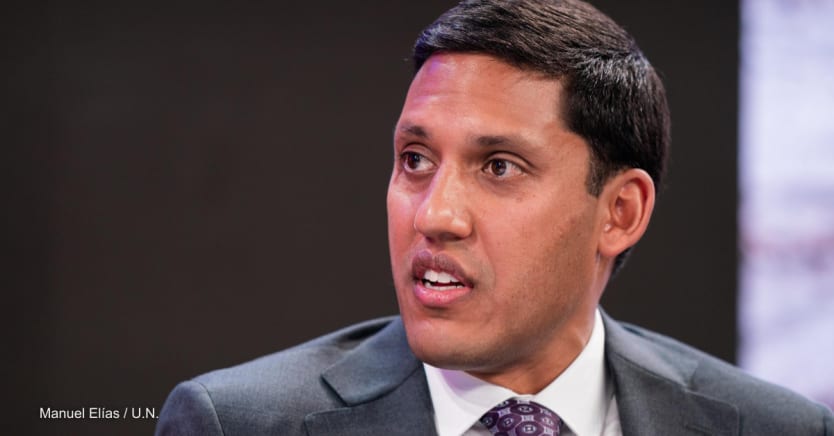
The Rockefeller Foundation has announced plans to make climate change central to its programmatic, operational, and investment strategies with the aim of tackling the growing threat that a warming planet poses to vulnerable populations.
In a public letter Tuesday, foundation President Rajiv Shah acknowledged the “irony” of the organization’s shift when the wealth of founders John D. Rockefeller and his son, John D. Rockefeller Jr., was derived from the oil industry.
“But with that money, [John D.] Rockefeller also established this organization, dedicated to advancing humanity through what he called ‘scientific philanthropy’ — leveraging the latest in science and technology to improve the well-being of each and every person, opening up opportunity for all,” Shah said.
The foundation had previously said it would divest its $6 billion endowment from fossil fuels. It now also plans to increase its climate action by focusing on areas such as food security in Africa, South Asia, and other regions likely to be impacted by severe droughts and flooding. It is expected to develop a strategy reflecting these changes for 2025 to 2030 that will be shared with trustees “within the year.”
The move echoes the “hard pivot” that The Rockefeller Foundation made during the COVID-19 pandemic when it repositioned programs to respond to the health crisis, Shah wrote. Like COVID-19, climate change is a “singular threat to humanity” that is hitting the most vulnerable populations hardest, he said. Shah cited World Health Organization data showing climate change could soon cause an estimated 250,000 additional deaths per year.
“Heat waves, droughts, floods, hurricanes, and wildfires are killing hundreds of thousands of people and reversing progress the Foundation and our partners have made in transforming food, clean energy, health, and economic systems,” Shah wrote. “If the world continues with business as usual, and the planet grows warmer by 3 degrees [Celsius] or more, life will become unbearable for many of the people we serve.”
The Rockefeller family established the foundation in New York in 1913 with an initial focus on scientific research and medical education. Public health has remained a major priority in its grant-making in subsequent years even as it expanded to new areas such as renewable energy.
Shah came on as the head of The Rockefeller Foundation in 2017 and after serving as the administrator of the U.S. Agency for International Development and a director at the Bill & Melinda Gates Foundation.
Under Shah’s leadership, Rockefeller has increased its focus on climate change and issues such as redefining “energy poverty,” a way of describing limited access to energy sources in the developing world. Last year, the foundation formed an alliance with the Bezos Earth Fund and the IKEA Foundation to raise $100 billion in public and private capital for renewable energy. It announced a $105 million strategy to increase global access to “healthy and sustainable” foods in March.
Philanthropy experts weighed in on the announcement Tuesday. Phil Buchanan, the president at the Center for Effective Philanthropy, tweeted that it was “Interesting” and “encouraging” to see The Rockefeller Foundation implementing a new climate change strategy. It is “surprising and disappointing” that more foundations aren’t doing the same, he said, highlighting data from a recent CEP report showing that just 22% of 188 foundation leaders said their organizations explicitly fund efforts to address climate change.
Data collected by ClimateWorks Foundation — a nonprofit that includes researchers, strategists, and grant-makers — also showed that climate change mitigation funding accounted for less than 2% of total philanthropic giving globally in 2020.
“The Rockefeller Foundation’s announcement is the type of bold action we urgently need to tackle the climate crisis and benefit lives. As a long-recognized, global leader in philanthropy, they are shining a bright light for others to follow,” wrote Shawn Reifsteck, ClimateWorks’ vice president of strategy, collaborations, and brand, in a statement to Devex.
Still, Rockefeller could have gone even further in pushing the concept of foundations acknowledging the harms caused by their historical sources of wealth, said Benjamin Soskis, a senior research associate in the Center on Nonprofits and Philanthropy at the Urban Institute.
“This is or should be distinct from pursuit of reputation laundering or greenwashing,” he wrote. All philanthropy "should have some element of redress in it … accounting for harms by which money was made,” with "constraints on how it is redistributed,” Soskis said.








